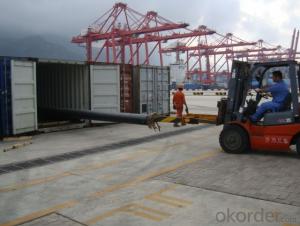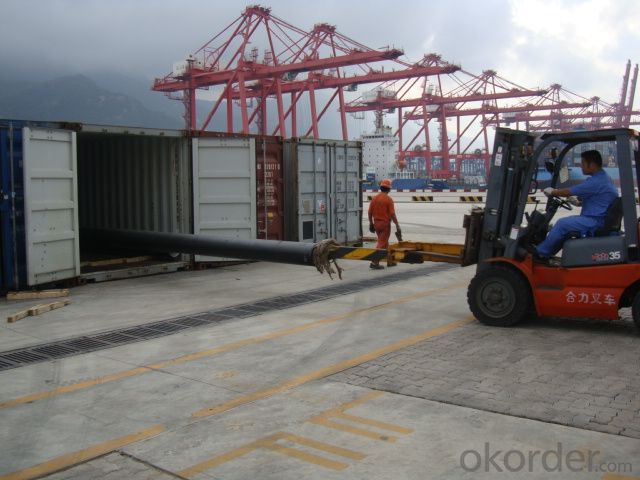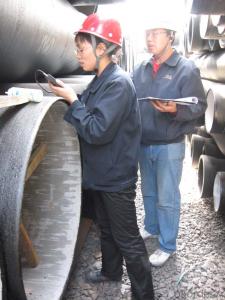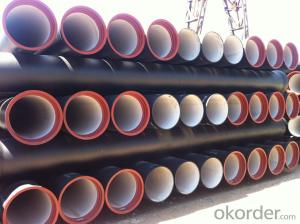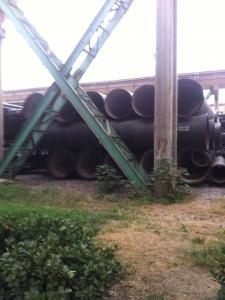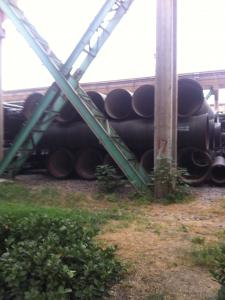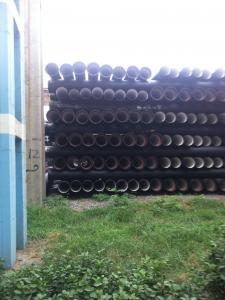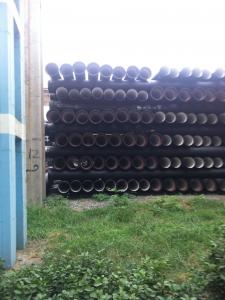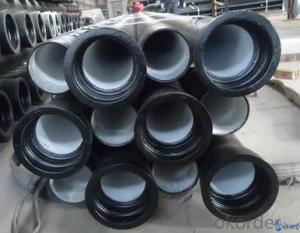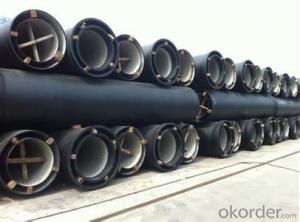DUCTILE IRON PIPES AND PIPE FITTINGS k9 CLASS DN200
- Loading Port:
- Tianjin
- Payment Terms:
- TT OR LC
- Min Order Qty:
- 25 pc
- Supply Capability:
- 30000 pc/month
OKorder Service Pledge
OKorder Financial Service
You Might Also Like
Material : Ductile Cast Iron
Size Range : DN 80mm to DN 2000mm
Unit Effective Length : 6m or 5.7m
Manufacture Standard: ISO 2531:1998/ EN 545:2006/EN 598:2007
Annual capacity : 200,000 tons
Coating Exterior: Zinc 130g/m2 according to ISO 8179-1 and bitumen coating 70 microns.
Cement Interior: Portland Cement/ High Alumina Cement/ Sulphate Resisting Cement Lining according to ISO 4179
Special requirements on external coating and internal lining can be applied
We also provide accessories such as SBR/EPDM rubber gaskets, lubricant paste, pipe caps, PE sleeves, etc.
Additional Parts:
Each pipe is strictly inspected according to related standard to ensure permanently high performance.
Easy Installation at site and service free for life
Long Service Lifespan
Quotation will arrive you within 24hours once we get your inquiry.
We guarantee offering you a competitive price.
A copy of original inspection reports of pipes will be offered after shipment.
Photos of loading process will be sent to the customer after shipment effect.
We will follow-up the delivery progress after shipment effect and update to the customer on weekly basis.
- Q: Are ductile iron pipes suitable for power plant applications?
- Yes, ductile iron pipes are suitable for power plant applications. Ductile iron is a type of cast iron that has enhanced strength, durability, and flexibility compared to traditional cast iron pipes. These properties make ductile iron pipes ideal for power plant applications where they are exposed to high pressure, extreme temperatures, and corrosive environments. Power plants often require a reliable and robust piping system to transport various fluids such as water, steam, and chemicals. Ductile iron pipes have high tensile strength and can withstand high pressure, ensuring the safe and efficient flow of these fluids within a power plant. Their ability to handle high-pressure steam makes them particularly suitable for power generation applications. Additionally, ductile iron pipes have excellent resistance to corrosion, which is crucial in power plants where many fluids can be highly corrosive. The internal and external linings of these pipes protect them from corrosion, ensuring a longer service life and reducing maintenance costs. This corrosion resistance also makes them suitable for transporting chemicals and wastewater within a power plant. Another benefit of ductile iron pipes is their ability to withstand extreme temperatures. Power plants often operate at high temperatures, and ductile iron pipes can handle these conditions without compromising their structural integrity. They have a high melting point and can resist thermal expansion and contraction, making them suitable for applications involving hot fluids and steam. Furthermore, ductile iron pipes are cost-effective compared to other materials commonly used in power plants, such as stainless steel or carbon steel. They offer a balance between performance and cost, making them an attractive choice for power plant applications. In conclusion, ductile iron pipes are well-suited for power plant applications due to their strength, durability, flexibility, corrosion resistance, and ability to withstand high pressures and extreme temperatures. Their cost-effectiveness further adds to their suitability for power plant piping systems.
- Q: Can ductile iron pipe be used for nuclear power plants?
- Yes, ductile iron pipe can be used for certain applications in nuclear power plants, particularly in non-safety-related systems such as cooling water, fire protection, or ancillary service pipelines. However, for safety-related systems that involve high-pressure or high-temperature conditions, materials with higher performance characteristics such as stainless steel or alloy materials are typically preferred.
- Q: DN300 how long is it for water polo and iron pipes?
- Blue interface cast iron pipe, blue fixed inner cushion rubber, blue gasket seal; rigid joint like cast iron pipe mouth, compared with straight pipe inserted cement sealing process, has been basically eliminated
- Q: What are the different corrosion protection options for ductile iron pipe?
- There are several corrosion protection options available for ductile iron pipes. These include internal linings such as cement mortar or polyethylene encasement, external coatings like zinc or polyethylene, and cathodic protection systems. Each option offers varying levels of protection and is chosen based on the specific needs and conditions of the pipe installation.
- Q: Can ductile iron pipe be used for oil and gas transmission pipelines?
- Ductile iron pipe is a suitable choice for oil and gas transmission pipelines due to its many advantageous properties. With its high tensile strength, it can withstand the pressures and stresses involved in this application. Moreover, ductile iron pipe exhibits excellent corrosion resistance, which is further improved by protective coatings on its exterior. In addition, its durability and longevity ensure the reliability of oil and gas transmission pipelines. Overall, ductile iron pipe offers a reliable and cost-effective solution for oil and gas transmission pipelines.
- Q: How does ductile iron pipe compare to PVC pipe in terms of performance and cost?
- Ductile iron pipe and PVC pipe have different characteristics in terms of performance and cost. Ductile iron pipe is known for its strength, durability, and ability to withstand high pressure and heavy loads, making it ideal for applications that require robust performance such as water distribution systems. On the other hand, PVC pipe is lightweight, corrosion-resistant, and more flexible, making it suitable for above-ground and non-pressurized applications like drainage systems. In terms of cost, PVC pipe is generally less expensive than ductile iron pipe, especially for smaller diameter pipes. However, as the diameter increases, ductile iron pipe becomes more cost-effective due to its superior strength and longer lifespan, which reduces maintenance and replacement costs over time. Ultimately, the choice between ductile iron and PVC pipe depends on the specific application, budget, and desired performance characteristics.
- Q: Can ductile iron pipes be used for wastewater reuse projects?
- Ductile iron pipes are suitable for wastewater reuse projects due to their various properties. Firstly, they possess high strength and durability, enabling them to withstand the pressure and load requirements of wastewater systems. Additionally, they exhibit outstanding corrosion resistance, a crucial factor in wastewater applications where the presence of chemicals and corrosive substances is common. Moreover, the smooth internal lining of ductile iron pipes reduces friction and enhances the flow of wastewater. This is essential for efficient transportation and distribution of wastewater in reuse projects. Furthermore, ductile iron pipes are renowned for their ease of installation and maintenance. They can be effortlessly connected using various joint options, facilitating quick and efficient installation. Additionally, their long service life reduces the necessity for frequent replacements and minimizes maintenance costs. In conclusion, the properties of ductile iron pipes make them a suitable option for wastewater reuse projects, providing strength, durability, corrosion resistance, smooth flow, and ease of installation and maintenance.
- Q: Can ductile iron pipes be used for rainwater harvesting systems?
- Yes, ductile iron pipes can be used for rainwater harvesting systems. Ductile iron pipes are known for their durability and strength, making them suitable for various applications, including rainwater harvesting. These pipes are resistant to corrosion and can withstand high pressure, which is essential for transporting rainwater from the collection point to storage tanks or distribution systems. Additionally, ductile iron pipes have a long lifespan, reducing the need for frequent replacements and making them a cost-effective choice for rainwater harvesting systems.
- Q: How do ductile iron pipes handle ground movement due to tree roots?
- Ductile iron pipes are known for their strong and durable nature, making them highly resistant to ground movement caused by tree roots. The flexibility of ductile iron allows it to withstand the pressure exerted by growing tree roots without fracturing or breaking. This is due to the material's ability to absorb and distribute stress, which helps to minimize the impact of ground movement. Moreover, ductile iron pipes have a smooth inner surface that minimizes the chances of tree root intrusion. The tightly sealed joints between the pipes also prevent roots from penetrating and causing damage. In instances where tree roots do manage to penetrate the soil and come into contact with ductile iron pipes, their resistance to corrosion provides an added advantage. Ductile iron pipes are coated with a protective layer that prevents the formation of rust and corrosion, ensuring their longevity and structural integrity. However, it is important to note that while ductile iron pipes are highly resistant to ground movement caused by tree roots, regular inspection and maintenance are still recommended. This allows for early detection and necessary repairs to be carried out if any root intrusion or damage is identified.
- Q: Can ductile iron pipes be used in tunneling or microtunneling projects?
- Tunneling or microtunneling projects can utilize ductile iron pipes. These pipes possess strength, durability, and flexibility, making them appropriate for underground applications. They can endure the external pressure from the surrounding soil or rock during tunneling, guaranteeing the project's integrity and safety. Furthermore, ductile iron pipes exhibit exceptional corrosion resistance, a vital characteristic for tunneling projects where the pipes are exposed to moisture and other corrosive substances. Moreover, their internally smooth surface facilitates the fluid or material flow through the pipes, rendering them an optimal selection for tunneling or microtunneling projects.
Send your message to us
DUCTILE IRON PIPES AND PIPE FITTINGS k9 CLASS DN200
- Loading Port:
- Tianjin
- Payment Terms:
- TT OR LC
- Min Order Qty:
- 25 pc
- Supply Capability:
- 30000 pc/month
OKorder Service Pledge
OKorder Financial Service
Similar products
Hot products
Hot Searches
Related keywords
